

Tariq Ali. Muslim voices of Enlightenment. Mahmoud Muhammad Taha: A voice for tolerance from the Muslim community. Ustazh Mahmoud Muhammad Taha did not stay free for long, however.
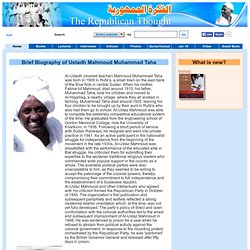
In the same year he was arrested, tried, and sentenced to two years’ imprisonment for leading a popular revolt against the British in the town of Rufa'a. Later he described that period in prison by the words: “When I settled in prison I began to realize that I was brought there by my Lord and thence I started my Khalwah with Him”. It was during two years of imprisonment, and a subsequent three years of self-imposed religious seclusion (Khalwah) in his home town of Rufa'a, that Al-Ustaz Mahmoud undertook the Islamic methods of worship that led to his understanding of the meaning of the Qur'an. Abdullahi Ahmed An-Na'im. Abdullahi Ahmed An-Na'im (born in 1946) is the Charles Howard Candler Professor of Law at Emory University School of Law.
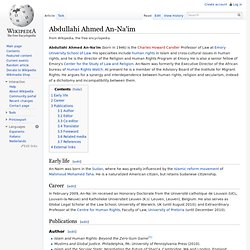
His specialties include human rights in Islam and cross-cultural issues in human rights, and he is the director of the Religion and Human Rights Program at Emory. He is also a senior fellow of Emory's Center for the Study of Law and Religion. An-Naim was formerly the Executive Director of the African bureau of Human Rights Watch. At present he is a member of the Advisory Board of the Institute for Migrant Rights. He argues for a synergy and interdependence between human rights, religion and secularism, instead of a dichotomy and incompatibility between them. Early life[edit] An-Naim was born in the Sudan, where he was greatly influenced by the Islamic reform movement of Mahmoud Mohamed Taha.
Career[edit] In February 2009, An-Na`im received an Honorary Doctorate from the Université catholique de Louvain (UCL, Louvain-la-Neuve) and Katholieke Universiteit Leuven (K.U. Islam and Human Rights. As is already clear from the aftermath of the fall of the Taliban in Afghanistan, reckless wars that topple regimes while leaving the structural causes of oppression and violence intact are not the best way to respond to human rights violations, the oppression of women, terrorism, or political violence.
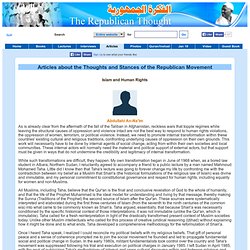
Instead, we need to promote internal transformation within these countries' existing cultural and religious traditions, confronting underlying causes of oppression on their own grounds. This work will necessarily have to be done by internal agents of social change, acting from within their own societies and local communities. These internal actors will normally need the material and political support of external actors, but that support must be given in ways that do not undermine the credibility and legitimacy of internal transformation. While such transformations are difficult, they happen. The success of such internal and cross-cultural discourse is dependent on several factors. Mike Davis (scholar) Mike Davis (born 1946) is an American writer, political activist, urban theorist, and historian.
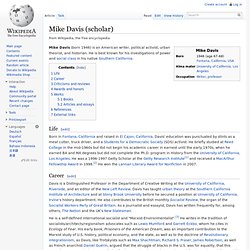
He is best known for his investigations of power and social class in his native Southern California. Davis is also the author of two fiction books for young adults: Land of The Lost Mammoths and Pirates, Bats and Dragons. In spite of the popular success of Davis' many critical studies, some have criticized them. Malibu Realtor Ross Ernest Shockley (aka "Brady Westwater") argued that Davis distorts or makes up facts to overdramatize his case against the contemporary capitalist city.
[citation needed] This argument was subsequently repeated by Los Angeles communications professional Jill Stewart, who labeled Davis a "city-hating socialist" in the New Times Los Angeles. According to Todd Purdum's unfriendly 1999 piece, Davis "acknowledged fabricating an entire conversation with a local environmentalist, Lewis McAdams, for a cover story he wrote for L.A. Nonfiction Fiction Notes Bibliography Reviews. ProPublica. USA. Justice / Sustainability Resources.
Privilege & Social Justice. Zombie Economics. Occupy Wall Street seem to oppose banker bailouts because bailouts are unfair.
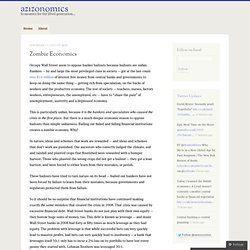
Bankers — by and large the most privileged class in society — got at the last count over $14 trillion of interest free money from central banks and governments to keep on doing the same thing — getting rich from speculation, on the backs of workers and the productive economy. The rest of society — teachers, nurses, factory workers, entrepreneurs, the unemployed, etc — have to “share the pain” of unemployment, austerity and a depressed economy. This is particularly unfair, because it is the bankers and speculators who caused the crisis in the first place.
But there is a much deeper economic reason to oppose bailouts than simple unfairness. Bailing out failed and failing financial institutions creates a zombie economy. In nature, ideas and schemes that work are rewarded — and ideas and schemes that don’t work are punished. So why was the banking system bailed out in the first place?
The system needs to change. Whistleblowers, Conspiracies, Illuminati.